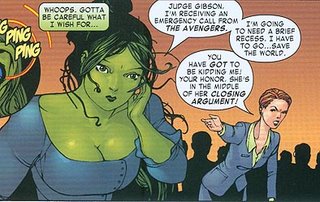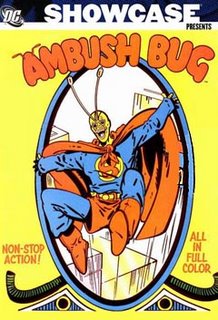She-Hulk #1
Writer: Dan Slott
Artist: Juan BobilloSynopsis: She-Hulk, working for the NYC District Attorney's Office, has a big case against one Mr. Paxton, whose company improperly stored antarctic vibranium, causing a warehouse collapse and potentially endangering the health of people who lived nearby. In the middle of her closing argument, Shulkie is called away on an Avengers mission. The judge declares a recess, and after she helps to defeat MODOK (and Frostbite, assuming anyone cares about him), she returns and finishes her case. The jury returns a guilty verdict in mere moments.
But the celebration doesn't last long. The judgment gets tossed because of the potential prejudice that She-Hulk's heroism had on the jury, and as a consequence of that and her other misbehaviors (which are depicted in the issue), She-Hulk gets fired. At issue's end, though, her career problems are solved when she's offered a position with the prestigious firm of Goodman, Lieber, Kurtzberg & Holliway...but the job offer is for her alter ego of Jennifer Walters, and not for She-Hulk.
Analysis: Before reading Dan Slott's She-Hulk series, my only exposure to the character was in issues of John Byrne's
Sensational She-Hulk that I'd bought out of discount bins. That was a very fun series, but Byrne did pretty much nil with his protagonist's legal side. About the most he did was to establish that she worked for District Attorney Blake Tower, which would be the same job that she loses in this issue.
(Quick question about She-Hulk: throughout the issue, Shulkie is depicted wearing glasses. Should this be taken to mean that despite all of her gamma-induced gifts, she still has poor eyesight?)
Most of the law and trial seen in the issue isn't terribly plot-relevant, but is mostly there as scene dressing. The only details on the "Paxton case" are those that we hear from She-Hulk's own mouth, so it's a little hard to pin down exactly what the case was supposed to be about. My gut reaction was that it didn't seem like a case that an Assistant District Attorney like She-Hulk ought to be handling. Its "Erin Brockovich"-esque elements make it sound more like a civil matter than a criminal one, and even if there's some kind of regulation involved, it'd probably be under the EPA or some other federal jurisdiction, and not the NYC DA's office. Then again, the details are vague and we
are talking about the handling of a fictional metal, so it's entirely possible that the MU's New York has a statute on the subject. There's just too much to speculate about.
Perhaps the biggest oddity in the content of the trial comes on page seven, when She-Hulk's talking to her boss prior to trial. They discuss a witness that she plans to call, a witness that she says will "blow this case wide open." But three panels later, she's in the middle of her closing argument. What happened to the whole middle of the trial? It's clearly the same day, and She-Hulk is still wearing the same, seriously inappropriate courtroom attire:

(Aside from the low-cut peasant blouse, what this panel doesn't show is that She-Hulk is also wearing tight red pants. She's well-dressed for clubbing, but not for court.)
She doesn't finish her argument, though, because she breaks it off when she gets an emergency Avengers beacon, and announces to the court "I'm going to need a brief recess. I have to go...save the world." The defense objects, but the judge responds "For the sake of the greater good, Avengers business must take precedence," as She-Hulk vaults herself out of the courtroom to fight MODOK.
After the case is over and the verdict's won, She-Hulk returns to work the next day to get some bad news from her boss. The defense attorney dropped by out of "professional courtesy" to inform the D.A. that the defense "just successfully got a mistrial" on She-Hulk's case. It seems that since She-Hulk's recess activities involved saving the lives of everyone on Earth, then that gave her "undue leverage over [the jury] and would explain their speedy verdict."
First, a few nitpicks. A couple of pages earlier, the defense attorney asks the judge if there are to be any special instructions to the jury, to which the judge replies no. If you've ever served on a jury, you know that jurors get a mind-numbing set of instructions before they get to deliberate. Many of these are standard instructions, used verbatim for typical cases. But often there are also special instructions that are requested, to clarify certain details. The nitpick here is that it's usually the attorneys who propose special instructions for the judge's approval, and not the judge who imposes them of his own initiative.
A "mistrial" is when a judge ends a trial prior to a verdict being reached. Such as when there's a hung jury, or when a witness states some excluded evidence. Here, there was a verdict reached; a guilty one. The judge could toss the verdict for a good reason (as happened in the
Todd McFarlane/Tony Twist case, but it wouldn't be called a mistrial.
And if the judge were going to toss a verdict, he wouldn't inform only one side of his decision to do so. In other words, D.A. Tower shouldn't be getting word of the judge's decision from opposing counsel.
However, I have to disagree with Tower's sentiments about this being a "dangerous precedent," and take the judge's side on this. Instant verdicts are guaranteed to raise suspicion. The prosecutor announced to the court, including the jury, that she had to go "save the world." The judge seemingly agreed with this (I think he holds some of the blame for letting this happen the way it did), and She-Hulk did go on to save the world. Given how that scene played to the jury, and given their near-total lack of deliberation before reaching a verdict, I'm definitely inclined to agree that the jury was prejudiced by She-Hulk's conduct.
That's not to say that there's no way to avoid these types of conflicting situations. It would be relatively easy to arrange for such emergencies. If She-Hulk got an Avengers beacon in mid-trial, she wouldn't blurt out heroic declarations in the jury's presence. She'd calmly ask to speak with the judge (along with opposing counsel) either at the bench or in the judge's chambers, where she'd explain the nature of the emergency. The judge would declare a recess, without telling the court exactly why, and She-Hulk would quietly and professionally pack up and leave.
And to be on the safe side, make sure the jurors are instructed to stay away from news reports. If a juror learns too much, he gets pulled and an alternate juror takes his place on the panel.
One would hope that Jen's new firm has arranged for such a contingency. Because even though subsequent issues depict Jen as the attorney in the courtroom, she could still get a call to duty and have to leave abruptly.
Next issue: Jen Walter's career with Goodman, Lieber, Kurtzberg & Holliway begins, and she takes the case of a superman suing over his origin.





